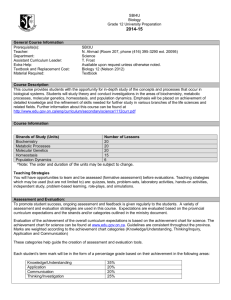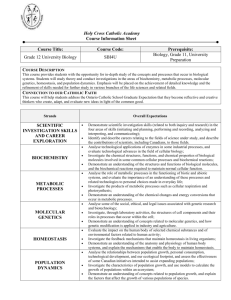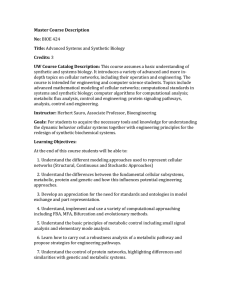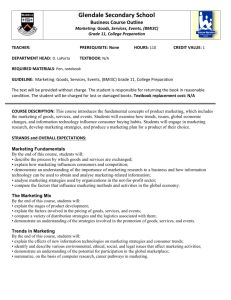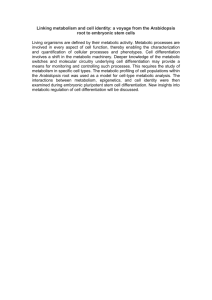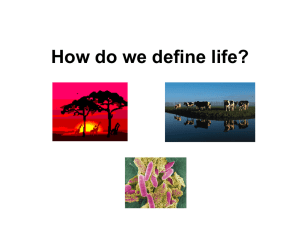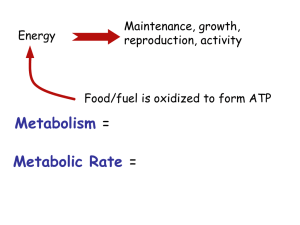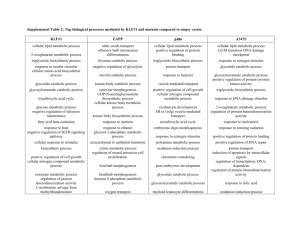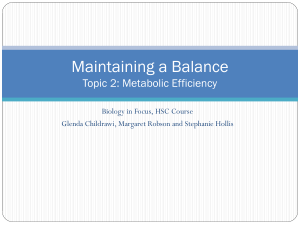Grade 12 Biology University Preparation Course Outline
advertisement
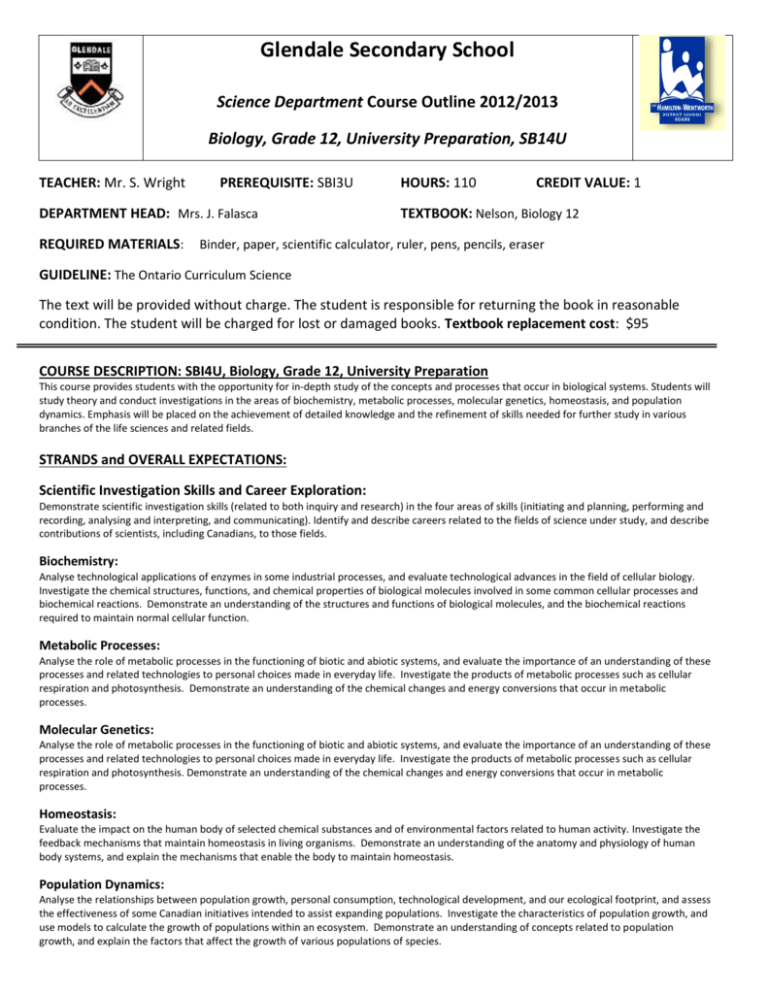
Glendale Secondary School Science Department Course Outline 2012/2013 Biology, Grade 12, University Preparation, SB14U TEACHER: Mr. S. Wright PREREQUISITE: SBI3U DEPARTMENT HEAD: Mrs. J. Falasca REQUIRED MATERIALS: HOURS: 110 CREDIT VALUE: 1 TEXTBOOK: Nelson, Biology 12 Binder, paper, scientific calculator, ruler, pens, pencils, eraser GUIDELINE: The Ontario Curriculum Science The text will be provided without charge. The student is responsible for returning the book in reasonable condition. The student will be charged for lost or damaged books. Textbook replacement cost: $95 COURSE DESCRIPTION: SBI4U, Biology, Grade 12, University Preparation This course provides students with the opportunity for in-depth study of the concepts and processes that occur in biological systems. Students will study theory and conduct investigations in the areas of biochemistry, metabolic processes, molecular genetics, homeostasis, and population dynamics. Emphasis will be placed on the achievement of detailed knowledge and the refinement of skills needed for further study in various branches of the life sciences and related fields. STRANDS and OVERALL EXPECTATIONS: Scientific Investigation Skills and Career Exploration: Demonstrate scientific investigation skills (related to both inquiry and research) in the four areas of skills (initiating and planning, performing and recording, analysing and interpreting, and communicating). Identify and describe careers related to the fields of science under study, and describe contributions of scientists, including Canadians, to those fields. Biochemistry: Analyse technological applications of enzymes in some industrial processes, and evaluate technological advances in the field of cellular biology. Investigate the chemical structures, functions, and chemical properties of biological molecules involved in some common cellular processes and biochemical reactions. Demonstrate an understanding of the structures and functions of biological molecules, and the biochemical reactions required to maintain normal cellular function. Metabolic Processes: Analyse the role of metabolic processes in the functioning of biotic and abiotic systems, and evaluate the importance of an understanding of these processes and related technologies to personal choices made in everyday life. Investigate the products of metabolic processes such as cellular respiration and photosynthesis. Demonstrate an understanding of the chemical changes and energy conversions that occur in metabolic processes. Molecular Genetics: Analyse the role of metabolic processes in the functioning of biotic and abiotic systems, and evaluate the importance of an understanding of these processes and related technologies to personal choices made in everyday life. Investigate the products of metabolic processes such as cellular respiration and photosynthesis. Demonstrate an understanding of the chemical changes and energy conversions that occur in metabolic processes. Homeostasis: Evaluate the impact on the human body of selected chemical substances and of environmental factors related to human activity. Investigate the feedback mechanisms that maintain homeostasis in living organisms. Demonstrate an understanding of the anatomy and physiology of human body systems, and explain the mechanisms that enable the body to maintain homeostasis. Population Dynamics: Analyse the relationships between population growth, personal consumption, technological development, and our ecological footprint, and assess the effectiveness of some Canadian initiatives intended to assist expanding populations. Investigate the characteristics of population growth, and use models to calculate the growth of populations within an ecosystem. Demonstrate an understanding of concepts related to population growth, and explain the factors that affect the growth of various populations of species. The primary purpose of assessment and evaluation is to improve student learning. ASSESSMENT The process of assessing student learning is continuous and on-going. Teachers use information gathered through assessments to provide feedback for students, to guide instruction and develop individual learning goals for students. This is assessment for learning. Students use this feedback to continuously improve their achievement and set individual learning goals. This is assessment as learning. Information from assessments informs the teacher’s professional judgment, but is not used in determining the student’s level of achievement. EVALUATION Evaluation is the process of determining a level of student achievement of the Overall Expectations for a course, which is recorded as a mid-term or final grade on a report card. Students will be given numerous and varied opportunities to demonstrate their achievement of the Overall Expectations across the four categories of achievement (Knowledge & Understanding, Thinking, Communication and Application). Evidence of student achievement of the Overall Expectations is collected over time from three different sources – observations, conversations and student products. To be successful students must demonstrate achievement of EACH of the Overall Expectations for the course. If a student is missing evidence of achievement of one or more of the Overall Expectations then a lower limit will be determined by the teacher. In determining a report card grade teachers use their professional judgment to interpret the evidence of student achievement which reflects the student’s most consistent level of achievement with special considerations given to the more recent evidence. The final grade is determined by the following breakdown: 70 % - evaluations made at the end of units throughout the semester. 30% - final demonstrations of learning (culminating activities and/or final examinations) REPORT CARDS Student progress is reported at 3 times during the semester. Interim Report – October and March. Reports on student Learning Skills and Work Habits with next steps for improvement. Mid-term Report Card – November and April. Reports on student achievement of the Overall Expectations to date. Incomplete achievement is reflected on Mid-term Report Cards, but replaced when learning has been demonstrated. Final Report Card – February and July. Reports on student achievement of all of the Overall Expectations. ACADEMIC HONESTY Students are responsible for being academically honest in all aspects of their schoolwork. Academic dishonesty includes a variety of behaviours including cheating, plagiarism, facilitating or aiding academic dishonesty, and the unauthorized access or manipulating of student records, work and computer programs. Such behaviours impede the learning process and threaten the educational environment for all students. Intentional academic dishonesty will result in disciplinary consequences. Teachers and parents should support students in striving for excellence and producing work with integrity. ATTENDANCE AND LEARNING SKILLS There is a direct link between good attendance and success at school. Students are expected to attend classes regularly and on time. Evidence of student achievement is gathered during classes through observations and learning conversations. Learning Skills play an important role in a student’s level of achievement. Students will be assessed on the following learning skills: responsibility, organization, independent work, collaboration, initiative, and selfregulation. CELL PHONES/PERSONAL ELECTRONIC DEVICES Teachers will determine when personal electronic devices, including cell phones, will be used as instructional tools/supports. At other times these devices (with the exception of electronic translators) are not to be used and must be turned off and be stored away. Consequences for inappropriate use of these devices may include removal of the device from the learning environment. DEPARTMENT/COURSE SPECIFIC INFORMATION Department Policies: Homework- Students should spend at least one half hour each day on homework. Reviewing notes daily is encouraged. Missed Evaluations including Tests - Students must demonstrate achievement of all the overall expectations for this course. Missing an opportunity for evaluation is a very serious matter. Students who miss evaluation due dates, including Unit Tests, will need to negotiate with their teacher when and how any missed expectations will be demonstrated. Teachers will determine lower limits for any curriculum expectations students have not achieved. Extra Help- Students are encouraged to seek extra help from their teacher when needed. SCHOOL WIDE SUPPORTS Student Support Team (formerly known as Learning Resource) o In-class help o Test and exam support o Alternate learning environment English Language Learner Support Team o Lunch-time help o Test and exam support Math lunch-time help Math Homework Help – on-line support Information via school website @ http://schools.hwdsb.on.ca/glendale/ School wide access to password protected wireless network o Access to on-line resources Literacy Coaching Literacy @ Lunch Learning Commons @ Lunch Paper and electronic calendars Teacher/department Lunch-time/before/after school help Glendale Secondary School Science Department Course Outline 2012/2013 Biology, Grade 12, University Preparation, SB14U TEACHER: Mr. S. Wright DEPARTMENT HEAD: REQUIRED MATERIALS: PREREQUISITE: SBI3U Mrs. J. Falasca HOURS: 110 CREDIT VALUE: 1 TEXTBOOK: Nelson, Biology 12 Binder, paper, scientific calculator, ruler, pens, pencils, eraser GUIDELINE: The Ontario Curriculum Science The text will be provided without charge. The student is responsible for returning the book in reasonable condition. The student will be charged for lost or damaged books. Textbook replacement cost: $95 I am aware of the course expectations and the policies and supports put in place for the student to be successful. Student’s Name: _______________________________________________________ Teacher’s Name: Mr. S. Wright Email: steven.wright@hwdsb.on.ca Contact Number: 905-560-7343 ext. 565 Department Head Name: Mrs. J. Falasca Email: jeannine.falasca@hwdsb.on.ca Contact Number: 905-560-7343 ext. 525 Parent/ Guardian Signature: ___________________________ Date:__________________ Student Signature: ___________________________ Date:__________________
